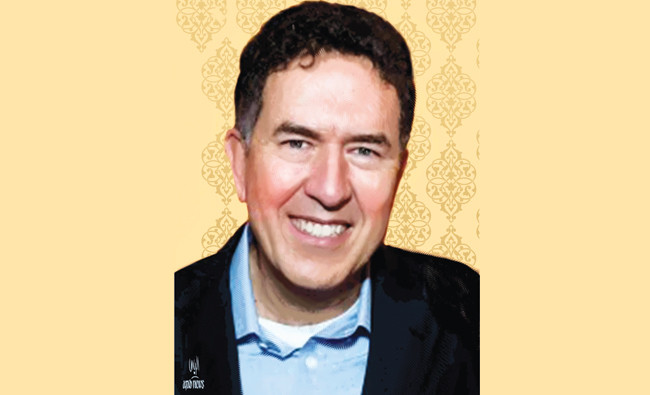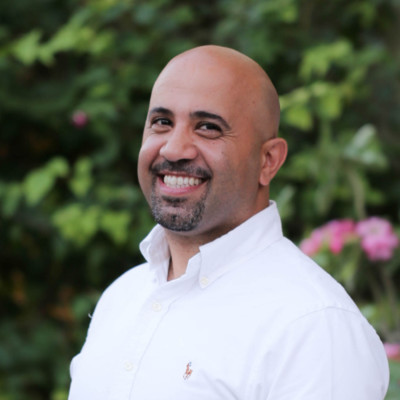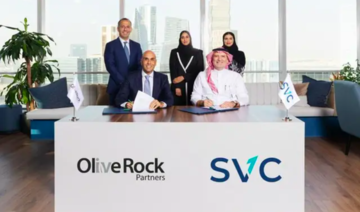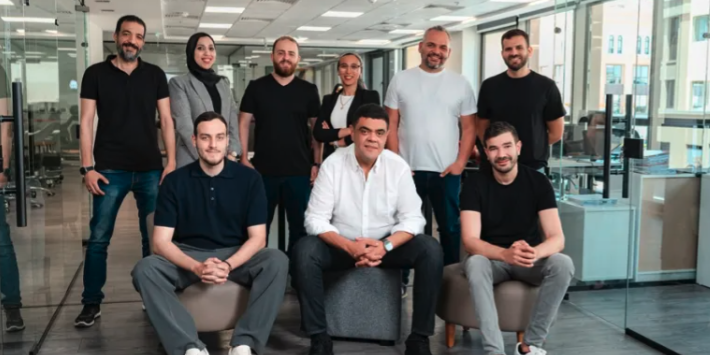DUBAI: Anybody who has attended one of the global gatherings of the World Economic Forum (WEF) in the past couple of years will have heard of the Fourth Industrial Revolution.
It is the WEF’s next “big idea,” and personally endorsed by its chairman and founder Klaus Schwab, who published the definitive book on what WEF calls “4IR” last year. He called it the “fusion of technologies that is blurring the lines between the physical, digital and biological spheres,” which is set to “fundamentally alter the way we live, work and relate to each other.” It all amounts to a “transformation unlike anything mankind has experienced before,” he said.
The concept has won buy-in across the world, but especially in the Arabian Gulf. Dubai was an early adopter, where the notion of 4IR coincided with its own “smart city” aspirations; Saudi Arabia has endorsed the principle with the announcement of the $500 billion mega-city of Neom, where artificial intelligence (AI) will rule and where robots will outnumber humans; Bahrain has also been increasingly involved with the WEF in giving another Gulf aspect to the idea.
But the WEF has chosen San Francisco in California as the global headquarters of its 4IR project, and appointed Murat Sonmez as the man in charge of it. A native of Istanbul, Turkey, but with a deep background in Silicon Valley — where many of the technologies behind 4IR are being developed — Sonmez leads a team of 31 people in partnership with 18 blue-chip corporate backers to study, assess and chart the progress of the 4IR.
“The 4IR hub in San Francisco is an accelerator and an accentuator, because now we have to focus more on how to accomplish it in a positive way. Because of the complexity of the issues involved, and the fact that things are moving so fast, no single country can figure it (out) all on its own,” he said recently when I caught up with him at a gathering of the WEF Global Futures Councils in Dubai, UAE.
In an attempt to explain the complexity and interconnectivity of the various elements of 4IR, Sonmez pulled out a piece of WEF notepaper and began to draw. In a series of vertical and horizontal boxes, he wrote items like “drones, autonomous vehicles, environment and robots,” then cross-referenced them to “cross-border data flows, AI, Internet of Things,” and — underlying the whole construct — blockchain.
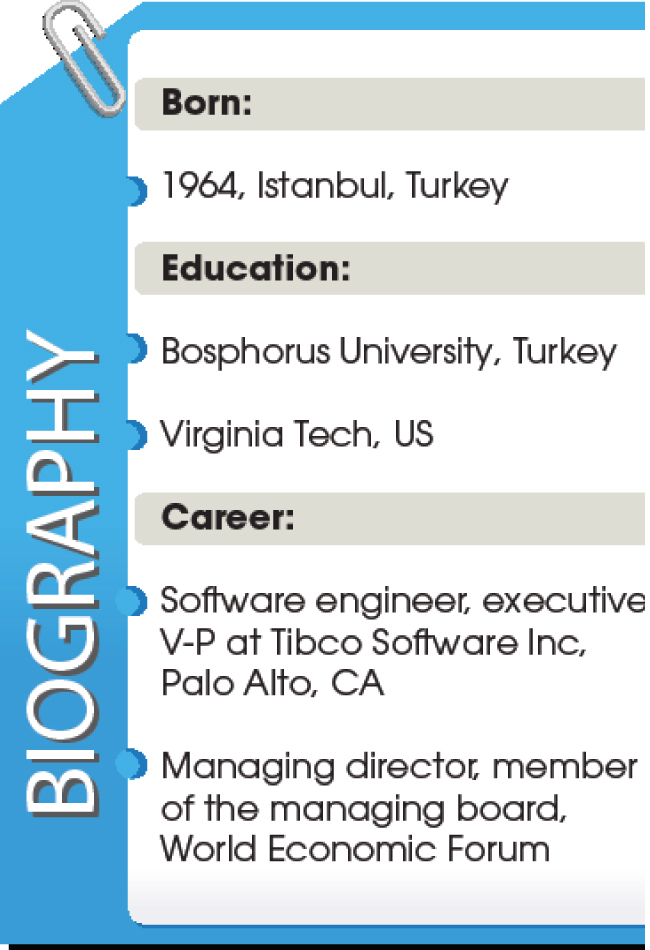
I felt a little more enlightened, but wondered whether blockchain technology — the digital transactions recording system that seems to figure in most conversations about business and finance these days — was really up to the job of supporting the whole 4IR edifice.
“Blockchain is still to be proven, but I have witnessed the creation of the World Wide Web, and blockchain has the potential to be more important than the World Wide Web. Of course, it can also be used by people with bad intentions, but it is the potential foundation for the whole of the 4IR,” he said.
Before he began working for the WEF some three years ago, Sonmez was a classic Silicon Valley entrepreneur. After education in industrial engineering in Turkey and in Virginia in the US, he ran global field operations for a company based at technology’s “ground zero” in Palo Alto, California, home to many tech pioneers.
“My company was one of the first to implement many of the protocols that now govern the World Wide Web,” he said. Pointing again to his hand-drawn illustration of the 4IR, he added, “Governments and corporations have realized they do not fully understand those vertical implications.”
Data has been called “the new oil” for its potential to change the way we live and do business, but the full impact of the data revolution and universal access to information is still unclear, he said. “Data can reduce energy consumption, cure cancer and make cities more liveable. So far governments have been focused on ‘people data’ but soon the full implications of the Internet of Things will become clear. There are 7 billion people on the planet communicating with each other in different ways and with different efficiency, but when there are 55 billion things talking to each other, the consequences are enormous.”
But misuse of data, and the propagation of false data, have become such red-hot topics lately that I wondered whether the downside risk was more than the upside potential.
“There are issues, of course. Fake data is a big problem. Brexit and the US election made people think again about the effects of uncontrolled data. So we need to authenticate the source of all data, and this will become even more complicated in the age of the Internet of Things,” Sonmez said.
“The aim of the 4IR hub is to look at critical technology and what it means for citizens and societies. Blockchain is the underlying enabling architecture, the foundation of everything else. AI and robotics are all based on underlying blockchain technology.”
Having definitively explained the importance of blockchain to the 4IR, Sonmez went on to talk about the work of the San Francisco hub and its potential global reach. Announced in summer 2016 and opened last March, “it has certainly caught people’s imagination. It’s trying to give the first comprehensive view of what 4IR means for all aspects of different industrial sectors,” he said.
Although the 4IR hub will remain in California, WEF is planning a series of global “satellite” centers. Japan and Rwanda are already involved in the San Francisco hub, so you might expect satellites to open in those countries too.
The Middle East, with its youthful demographic and high levels of technology penetration, is a natural home for such a satellite. Bahrain has also been taking an active interest in the San Francisco project, and is probably favorite to host a 4IR center in the region.
“There has been lots of interest to partner with 4IR, and there will be other centers, in different parts of the world. We expect others to be announced in Davos next January,” he said, referring to the annual meeting of the WEF in Switzerland.
But the competition to become a 4IR center in the region is hotting up. Already Dubai is well down the road to “smart city” status, and enjoys a close relationship with the WEF. Saudi Arabia too is increasingly featuring in the WEF plans for international expansion.
The mega-city of Neom, announced at the recent Future Investment Initiative by Crown Prince Mohammed bin Salman, would seem to be a perfect case-study for a 4IR-related project. Billed as one of the “new generation of cities,” the trans-national development will cover 10,000 square miles, and high technology will be at its center. Sonmez likes the idea.
“I think it’s an excellent plan to create a ‘sandbox’ where you design new governance models for 4IR. Having a new city as pilot for the whole project is a great idea, and I see building such a city from scratch as a possible option, for a place where you can test the ideas of 4IR in practice,” he said.
He saw it in the broader context of closer liaison between the WEF and Saudi Arabia, as the Kingdom seeks to modernize its economy and move away from oil dependency under the Vision 2030 strategy.
“We’ve had discussions regarding greater WEF involvement with the Saudi government and we’re following the progress of Vision 2030 with great interest. We’d welcome more active participation. We already have good relationships with Saudi corporations at WEF, like Saudi Aramco, the Public Investment Fund and SABIC, and would like further engagement with Saudi Arabia in systemic issues involved with 4IR.
“We’ve been working closely with the Saudi government on a co-design of governance protocols for 4IR, and we’d be happy to extend that cooperation further,” Sonmez added. Vast sums of money are being invested by governments and private corporations in the fields of AI, robotics and biotechnology, but he also believes that the 4IR can, to a certain degree, become self-financing. “A lot of money is being spent on critical areas, such as banking, health care and education. But the new technology can enhance efficiency in these areas. Technology can deliver health care and education to the millions, and we can cut down expenditure on building hospitals and schools,” he said.
But Sonmez warns that attempts by national governments to restrict access to data could rebound and prove counterproductive to the potential positive benefits of 4IR.
“I feel there has to be a new openness about the 4IR. If you look at what is happening in some parts of the world, including the West, you will see attempts to try to limit access to data in one country, or exclude it from others.
“But if you try to do this, you miss out on the global benefits that you can get from aggregating data, for example in agriculture, health care or energy. You have to be able to combine different data sets from around the world,” he adds.
The international nature of the challenge from 4IR is key to the whole initiative from San Francisco outwards. “Our strategy has been identified and is in the execution phase, but now there is a need to energize the global effort to fully exploit local possibilities,” Sonmez said.


